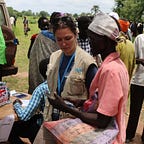Supporting self-sufficiency in South Sudan
How a UK aid supported project is transforming the lives of people in one of the most food insecure regions.
On a wet morning in South Sudan’s Northern Bahr el Ghazal State, residents of four villages walk briskly towards the village of Malekdit. On each side of the road, the bush has become dense, interspersed with small household farms of sorghum and other staple crops.
The men and women gather under a tree eagerly waiting for the distribution of cash to start. They are some of the 230 participants of the Building Resilience through Asset Creation and Enhancement (BRACE II) project in Malekdit, implemented by the World Food Programme (WFP) and the UN Food and Agriculture Organisation (FAO).
The UK aid funded project enables communities to learn improved agricultural techniques to increase yields and to build assets that can strengthen their resilience to natural disasters and climate shocks. In return for the days worked on the building or boosting of assets that will benefit the whole community WFP provides monthly cash assistance to households. The monthly cash transfers help to ensure that households have enough food to eat and energy to participate in community activities. Families say they are happy about the changes this project, which runs until 2018, is bringing to their lives.
“You have encouraged us a lot,” said Apot Yai Deng, a widow and mother of six children. “We appreciate your support for our work and we will continue so we have our own food.”
Using the new techniques she has learnt, Apot has planted sorghum next to her house and knows that with the harvest she will be able to care for her children even after the project ends. She is using the cash she receives to buy the food her family needs to stay healthy.
At the beginning of the project, household members gathered together to discuss their main challenges and to identify small scale projects that could help them overcome these challenges. With most households facing hunger, WFP and FAO encouraged them to work on agricultural and income generating projects, such as crop farms and vegetable gardens that will help them meet their own food needs after the harvest.
In 2016, Mawien Diany planted only sorghum, which is one of the main foods eaten in Northern Bahr el Ghazal. From the training he received from FAO, Diany has learnt the importance of inter-cropping — planting more than one type of crop so that if one fails, he will be able to rely on the other. This year he has planted groundnuts and sorghum and has worked hard to prepare and plant more than he planned.
“We are determined thanks to this project and we will continue to cultivate so we have our own food which can support our families,” Diany said.
In the coming months he will be able to harvest his crops and plans to eat the sorghum at home and sell the groundnuts in the local market.
“I thank the UK — because of their support we have food and we have money, and now we can cultivate for ourselves,” he added.
About 98,000 people are benefiting from the assistance provided by WFP and FAO through the support from UK aid in Northern Bahr el Ghazal & Warrap states. The project is contributing to promoting a sense of ownership of the assets amongst community members and improving longer-term food and livelihoods security.
